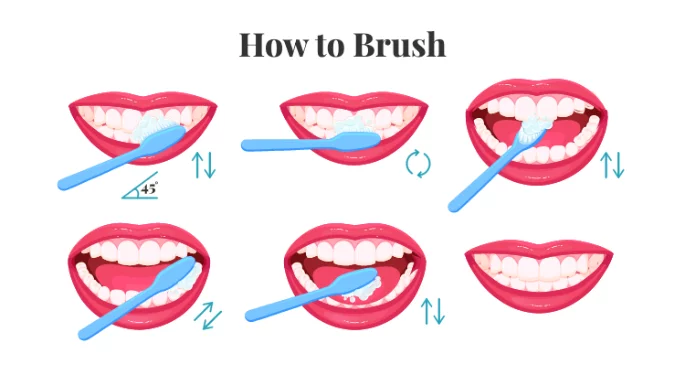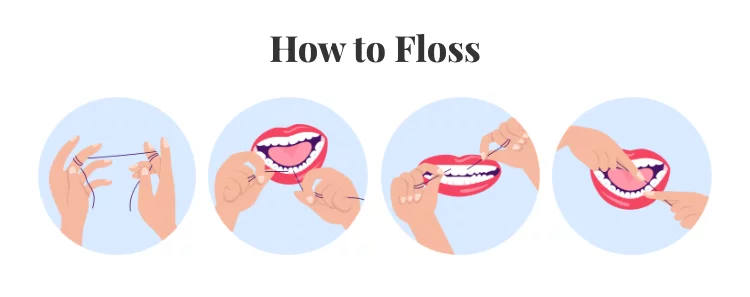Developing, and practicing, life-long oral health habits is an important part of your overall health and wellness. Implementing the following dental hygiene tips can keep your mouth, and body, healthy.
Dental and Oral Issue Symptoms
- Ulcers and sores that don't heal after a week or more
- Gums that bleed after brushing and flossing
- Chronic bad breath
- Tooth sensitivity to hot or cold foods and drinks
- Dry mouth
- Toothaches or pain
- Receding gums
- Pain associated with biting or chewing
- Cracked or broken teeth
Can Bad Dental Hygiene Cause Health Issues?
Neglecting aspects of your health can cause illness and disease throughout the body. That includes the mouth too because of the oral health-body connection. Health problems related to poor oral hygiene include gum disease, cancer, diabetes, and heart disease.
Cardiovascular Disease
Gums become inflamed due to bacteria that cause periodontal disease. If bacteria gets into a person’s bloodstream, it can clog arteries from the build-up of plaque. The arteries then harden. That process of the arteries hardening is referred to as atherosclerosis.
Dementia
The brain can also be affected by poor oral hygiene. Inflamed gums can release substances that kill brain cells and cause memory loss. Dementia can be caused by mouth bacteria that result from gingivitis. The bacteria enter the bloodstream or spread to nerve channels. Alzheimer’s Disease is another possible disease caused by poor dental hygiene.
Respiratory Infections
Diabetes
Diabetes is harder for patients to control when they suffer from periodontal disease. The symptoms of diabetes worsen when gum disease causes a diabetic’s blood sugar to reach unsafe levels. So anyone with poor oral health is at an elevated risk for developing diabetes.
Pregnancy Complications
Moms-to-be need to practice good oral hygiene because hormonal changes in their bodies during pregnancy make them more susceptible to developing oral infections. The risk of pregnancy complications is increased with the development of any bodily infection. Gingivitis and periodontitis can cause premature birth and low birth weights in babies. Gum disease increases the chances of health issues for both the mother and her baby.
Infertility
Infertility in women and poor oral health are connected. Gum disease makes conceiving and maintaining a pregnancy more difficult for a woman. Women who have poor oral health can also take longer to become pregnant than women who have good oral health.
Erectile Dysfunction
Cancer
Any sort of tobacco use can lead to oral or throat cancer. Poor oral health also increases the risk of developing kidney cancer, pancreatic cancer, and blood cancer.
Kidney Disease
People who suffer from gum disease tend to have weaker immune systems, so they are more susceptible to infections. Those infections can lead to kidney disease. Kidney disease affects the kidneys, heart, blood pressure, and bones. It can lead to kidney disease or cardiovascular disease – both are potentially fatal.
Rheumatoid Arthritis
Can Bad Teeth Make You Sick?
Rotten teeth are just one health issue that can result from poor oral health. Besides bad breath, bad teeth affect the rest of your body by causing serious health issues.
Trembling Hands
Blood Poisoning
Taste Reduction
Sepsis
Meningitis
How to Prevent Poor Oral Hygiene?
Seeing a dentist for regular checkups and professional teeth cleanings is one of the best ways to ensure your mouth stays healthy. Cleanings remove plaque and tartar from the teeth before they can cause cavities, gingivitis, gum disease, or other mouth health issues.
Dental Hygiene Routine
Brush Regularly
Brush your teeth for two minutes at a time at least twice daily. Use a brush that has soft bristles and brush with toothpaste that contains fluoride.

Toothbrush Replacement
Floss

Fluoride Treatments
Fluoride is a naturally occurring mineral that helps strengthen tooth enamel. Enamel is the hard, protective coating found on the outside of each tooth. Your dentist might recommend fluoride treatments to keep your teeth strong and prevent tooth decay. They can be performed in your dentist’s office after a cleaning.
Limit Sugary and Acidic Foods
Start by eating a balanced diet that limits foods high in sugar and starch. Swap out processed carbohydrates – which can be high in sugar – for fresh fruit and vegetables. Those contain natural sugars at lower levels than processed foods.

Find a Dentist Near Me
Consult your dentist to discuss your questions about dental hygiene. Or, check out The Smile Generation to find a dentist near you for all your dental hygiene questions and tips. You can read patient reviews, peruse staff bios, and schedule an appointment online with a click of your mouse.
Find your trusted, local dentist today!
Sources
“Everything You Need to Know About Dental and Oral Health,” Healthline, Mar. 2019, https://www.healthline.com/health/dental-and-oral-health
“10 Health Issues Caused by Bad Oral Health,” Absolute Dental, December 2021, https://www.absolutedental.com/blog/10-health-issues-caused-by-bad-oral-health/
“Poor Oral Hygiene Symptoms and Health Risks,” Total Care Dental, https://www.tcdmadison.com/DentistryBlog/PoorOralHygieneHealthRisks
“The Dangers of Rotten Teeth,” McCarthy Dentistry, https://www.mytotaldentistry.com/blog/the-dangers-of-rotten-teeth/
“Brushing Your Teeth,” Mouth Healthy, https://www.mouthhealthy.org/en/az-topics/b/brushing-your-teeth
Smile Generation blog articles are reviewed by a licensed dental professional before publishing. However, we present this information for educational purposes only with the intent to promote readers’ understanding of oral health and oral healthcare treatment options and technology. We do not intend for our blog content to substitute for professional dental care and clinical advice, diagnosis, or treatment planning provided by a licensed dental professional. Smile Generation always recommends seeking the advice of a dentist, physician, or other licensed healthcare professional for a dental or medical condition or treatment.








